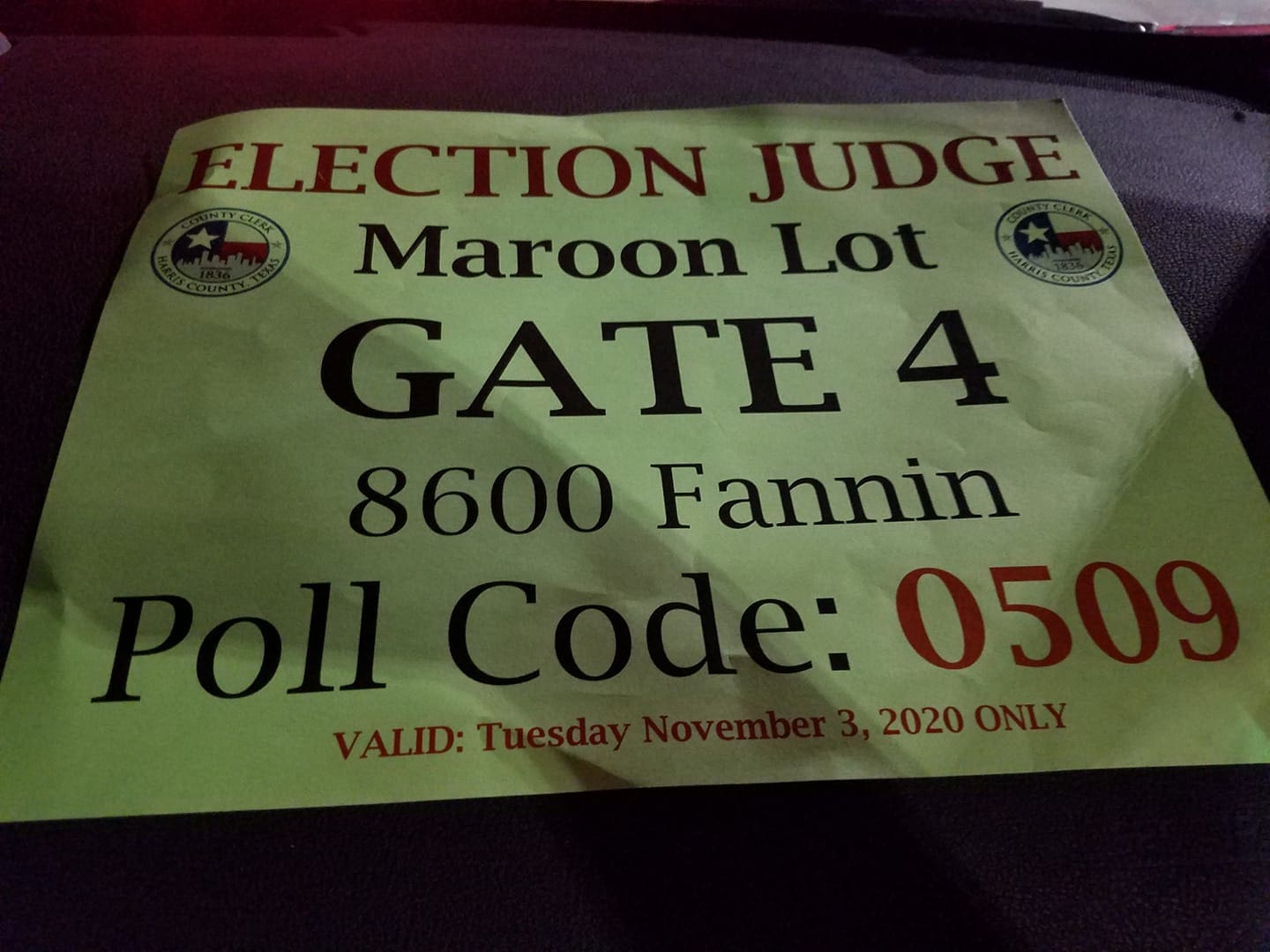In this year’s presidential election, Texas voters faced a confusing array of new voting rules and procedures rushed into place due to concerns about the Chinese coronavirus—from an executive-ordered extension of in-person early voting to a made-up “drive-thru” voting process.
Adding to the confusion, Democrats filed a flurry of lawsuits attempting to change the state’s election laws—most notably to expand mail-in voting to everyone—leaving Texas voters to wonder exactly when, where, and how they could cast ballots.
Few people were in a better position to observe the chaos caused by all of the changes than Felicia Cravens, a veteran front-line poll worker in Harris County—the third-largest county in the nation with over 2.4 million registered voters.
Cravens, a grassroots activist, political blogger, and founder of the original Houston Tea Party, served as an election judge during the extended early voting period and on Election Day.
She’s one of thousands of citizens dedicated to running fair and accurate elections in their communities.
Starting in mid-October, she took to Twitter (@somethingfishie) to share her interactions with voters and county elections officials, as well as her insights into the process.
“Some of the people running the elections here had really, really bad processes and poor communications around them,” Cravens tweeted on November 5. “I’m confident in the elections I actually run. But it’s getting harder to do it.”
Harris County’s election office is run by County Clerk Chris Hollins, a Texas Democrat Party official, who invented drive-thru voting and set up the county’s first 24-hour polling places. Hollins also proposed sending mail-ballot applications to all registered voters in the county but was stopped by the Texas Supreme Court.
“Everything y’all see people celebrate as ‘increased access’ has a learning curve and a cost associated with it that you never see,” Cravens said:
Drive-thru voting was great, right? Except it’s harder to monitor interactions and prevent undue influence.
Twenty-four hour voting sites are amazing, right? Except the successful handoff to a night crew depends on trained and experienced clerks, which wasn’t the case.
Extended hours until 10 p.m. was so convenient, right? Except hardly anyone came then, and it also meant 16-plus hour days for the judges since we are first in, last out. Then we’d have to be back on-site at 6 a.m. the next morning.
And do you know who serves as election judges? Older people. Few twenty-somethings take those positions. How well do you imagine election judge grandmas can perform after several consecutive 16-hour days?
As it turned out, extended early voting simply changed when many people voted. On Election Day, Cravens said fewer than 100 voted at her polling place—one of over 800 countywide—at a cost of over $2,000 just to pay poll workers.
Cravens urged Texans to reconsider supporting all these massively expensive and expansive voting initiatives.
“This election was brutal to many election workers,” she said. “My last week as an alternate judge, I clocked about 94 hours.”
Democrats encouraging more people to request mail ballots created more issues for poll workers and in-person voters.
“I can’t tell you how many mail ballots we’ve canceled for folks in two weeks of early voting. Boxes of them,” Cravens tweeted on October 26. “Many tell us they were worried about COVID when they applied for mail ballots, but feel less at risk voting in person now.”
 Cravens said they discovered a flaw in the county’s mail-ballot surrender process that could have allowed fraudulent votes to be cast. Hollins changed the process mid-election (one of multiple changes, according to Cravens) after workers “raised a stink.” She added she didn’t think anyone had actually exploited the flaw to commit fraud.
Cravens said they discovered a flaw in the county’s mail-ballot surrender process that could have allowed fraudulent votes to be cast. Hollins changed the process mid-election (one of multiple changes, according to Cravens) after workers “raised a stink.” She added she didn’t think anyone had actually exploited the flaw to commit fraud.
“But we don’t need to guard only against what has happened, but also what can happen. Anyone in any kind of security can tell you that,” she said.
Cravens said ballot security is her main concern and is “something we need a lot more people involved in.”
“I believe it should be pretty easy to vote,” she said. “But I also believe voters need to make the effort to be registered and get proper ID where required.”
I know during COVID, nobody can get to the DPS to get a license, but we take expired ones in Texas up to four years past the expiry date. That’s really generous.
We also have a process if you don’t have an ID or passport, or have just an out-of-state license. Just know that photo ID laws aren’t there to stop you from voting, they are there to stop someone from voting in your place.
She said an interaction with a curbside voter and his elderly mother during early voting illustrated just how much we need honest people running elections:
I check him in and then go inside to get the voting machine. We always send two clerks (of opposite parties, when possible) to bring out the machine so that there are checks and balances, accountability. So, I grab one of the Democrat young guys working and let him carry it. We pass the voter the machine, and I chat with the clerk while the voter does his thing.
When the voter finishes, he tells us he’s going to have to help his mother vote. He says she has Alzheimer’s and needs his assistance. And this is where the ethics have to be solid.
You hear stories of folks mining mail ballots at retirement centers or taking advantage of elderly or otherwise disabled people. It’s easy to see how that could be done at those places, but here’s a guy expecting to vote for his mom at the polling place.
For the record, I don’t really think he was trying to engage in fraud. But it’s a hard rule we have that the voter has to request the assistance. And I had been watching his mom each time I had occasion to be near the car. At best, she was taking a heavy nap. And there was no way she was in any shape to request assistance to vote.
“I could easily have let this guy vote for his mom, let him prop her up and move her fingers,” Cravens said. “I took an oath, though, and I do my best to live up to it. That means something to me.”
I don’t care if the rest of the world is cheating. I have to look at myself in the mirror each day.
When we have “runners”—voters who left the booth without casting a ballot—we can’t press the button for them. We have to try to catch them and get them to return to do it themselves.
I mean, we could, but we don’t.
In an election of this import and magnitude, we are relying on those ethics to restrain thousands and thousands of election officials, when they could easily break a simple rule for a “good cause.”
What matters, she said, is the ethical weight that people working and administering elections carry with them. Without that, confidence in election results will continue to tank:
Every election process needs a thorough re-evaluation to make sure as many loopholes as possible are closed.
Every system needs to be audited to ensure transparency, accuracy, and fairness.
And that needs to happen no matter which side you’re on.
We should have honest conversations about how to build in more procedures to prevent fraud, regardless of how much of it actually occurs, regardless of whether it’s isolated or widespread.
Those conversations will end up in the Texas Legislature when it reconvenes next year.
Grassroots activists in the Republican Party of Texas chose election integrity as their top legislative priority for the 2021 session. Voters’ experiences in Texas and across the country during the presidential election have only increased interest in beefing up laws to make elections more transparent and secure.
“Unless we do these things, unless we fight for good, clear, honest, fair processes, and do so consistently, we have only ourselves to blame for this mess,” Cravens said.





